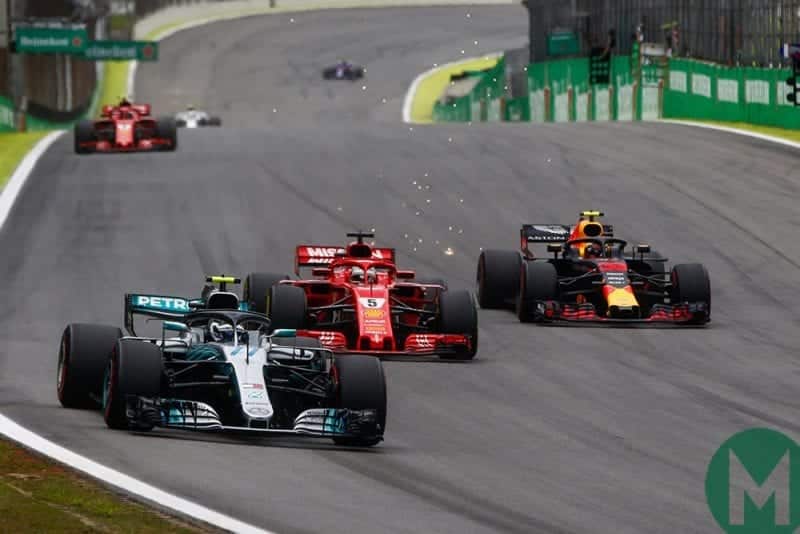
Verstappen proves Russell right: Abu Dhabi GP 2024 – Up/Down
Verstappen's prang at the first corner of the F1 finale in Abu Dhabi vindicated George Russell's recent rant

So maybe Helmut Marko was bluffing when he recently suggested that Red Bull could look at Le Mans if the post-2020 Formula 1 regulations are not to its liking. But even if he was, it’s an interesting train of thought.
Marko was pondering on a Le Mans programme as an alternative, but what if it was in addition to F1? Could Le Mans, in fact, be the answer to the apparent impasse between the haves and have-nots in F1 over budget caps?
First, let’s emphasise that this is not something that is even being discussed at the moment – but maybe it should be. What if there was a way of framing the future F1 regulations to say that any team employing more than x number of employees or spending beyond y number of dollars is obliged to run a Le Mans programme in addition to F1?
We could see Ferrari, Mercedes and Red Bull each running Le Mans teams while retaining all their employees and facilities. Mass redundancy is a concept that all these teams – and F1 in general – are very reluctant to embrace.
The top teams are never going to agree to the amputation of a limb
The teams have the money, they have invested in people and facilities over the years – and now at the stroke of a pen they are being asked to surrender the fruits of all that and put hundreds of people out of work. So what about just re-allocating those people and facilities instead – and in the process chase success in one of the world’s most prestigious events?
It could never happen, you might say, because an experienced Le Mans entity like Porsche, devoting its full budget only to Le Mans, could inevitably crush them. Could they? Much of Porsche’s Le Mans budget would be spent on the sort of facilities the top F1 teams already have.
Yes, Porsche would have a big head start in experience, but these would be multi-year programmes.
At the moment there is a sharp divide between F1’s top three teams and the rest – based upon their very different circumstances. To continue with the vast current income gap is not sustainable for the smaller teams; to bring the big teams down to the size of the small ones is a non-starter and would place Ferrari, Mercedes and Red Bull in an impossible situation.
More:
As McLaren’s Zak Brown said recently: “That is for Chase [Carey, Liberty boss], Ferrari and Mercedes to work out.
“All we can do is be in control of our own destiny and take our own view of what we think is healthy for the sport and Chase does not have an easy job.
“We know change in F1 is difficult and we also know F1 today is a broken model, both as a business and as an on-track product, and that is going to need to be changed and those that are winning today will obviously feel that compromise is what is happening today, and those are not winning today are going to like the plan.
“So it was inevitable that Chase would bring forward a plan that some people like and some people don’t like.
“He needs to move forward with what he thinks is in the best interest of the sport because at the end of the day, what is in the best interests of the sport in the long term is in the best interests of everyone if people can get past the short-term compromises that they need to make.
“I think [in] today’s F1, if it stays as is, everyone eventually loses.”
If the Le Mans and F1 regulations could be framed as complementary to each other to facilitate factory participation in both, surely everyone wins?
Furthermore, if F1 technical regulations were framed so as to limit the lap time boost each extra dollar gains you, then the top teams could maintain whatever spend limits they liked – but it would be advantageous to alter the balance towards the Le Mans programme.
In that way their actual F1 spend might shrink to something that would allow the smaller teams to at least compete. Having the winner of the unofficial ‘Class B’ being invariably lapped by the top teams – which is where we’ve got to now – is not going to maintain sufficient interest in F1 in the long-term.
The top teams are never going to agree to the amputation of a limb; the small teams need some of the oxygen that is being monopolised by the big teams. How does this conflict get resolved?
Probably by thinking out of the box.
If, in that process, fans got to see a more unpredictable F1 and a fantastic vintage era of Le Mans, that would be a good thing, right?

Verstappen's prang at the first corner of the F1 finale in Abu Dhabi vindicated George Russell's recent rant

FIA president Mohammed Ben Sulayem seemed intent on making F1 a united front by the end of the 2024 Qatar GP – against him

Leclerc erupted after feeling wronged one time too many by Sainz in Vegas – but the challenge posed by his team-mate next year, Lewis Hamilton, will be much greater writes James Elson

2024 has been Max Verstappen's masterclass – it should go down in history as one of F1's greatest titles